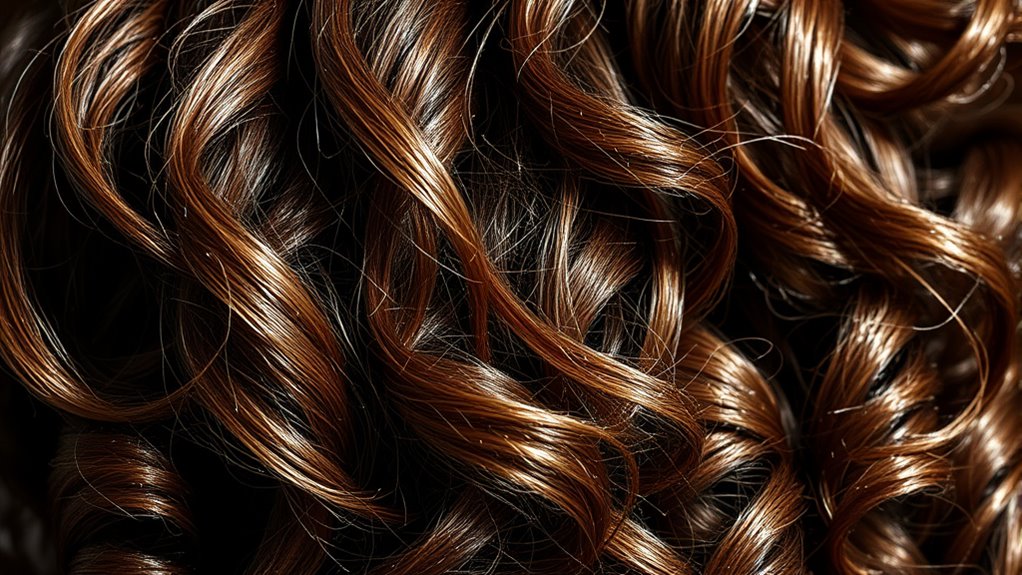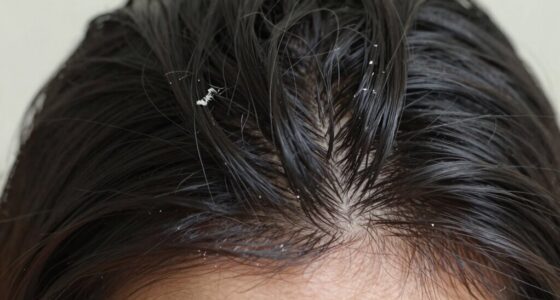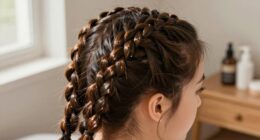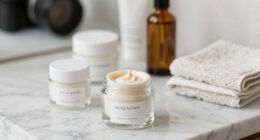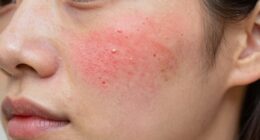To retain moisture and keep your hair hydrated, regularly use lightweight oils like coconut or argan to lock in moisture, and massage your scalp to boost circulation. Wash with gentle, hydrating shampoos, and finish with lukewarm water to prevent dryness. Incorporate deep conditioning treatments weekly, avoid heat styling, and use leave-in conditioners or sprays throughout the day. Continue exploring effective techniques to maintain lush, healthy hair during your hair care journey.
Key Takeaways
- Use lightweight oils like coconut or argan to seal in moisture with scalp massages and warm oil treatments.
- Incorporate hydrating shampoos, conditioners, and leave-in sprays containing hyaluronic acid, glycerin, or aloe vera.
- Avoid hot water; rinse with lukewarm water and finish with a cool rinse to lock in moisture.
- Schedule weekly deep conditioning treatments to replenish lost hydration and improve hair elasticity.
- Minimize heat styling and chemical treatments; always use heat protectants to prevent moisture loss.

Hair hydration is essential for maintaining healthy, shiny, and manageable hair. When your hair stays properly moisturized, it looks vibrant, feels soft, and is less prone to breakage. One effective method to boost hydration is scalp oiling, which not only nourishes your scalp but also helps lock in moisture from the roots. By regularly applying lightweight oils like jojoba, coconut, or argan oil, you can create a barrier that prevents moisture loss and promotes healthier hair growth. When you scalp oil, massaging gently helps increase blood circulation, ensuring your scalp receives the nutrients it needs to stay hydrated. Remember, the key is to use oils sparingly—overdoing it can weigh your hair down or cause buildup.
Incorporate scalp oiling into your routine as part of your hydration tips, especially if you notice dryness or flakiness. Before washing, warm a small amount of oil and massage it into your scalp for a few minutes. This not only conditions the scalp but also helps in loosening dead skin cells and excess sebum, allowing your hair to absorb moisture more effectively. Leaving the oil on for at least 30 minutes, or even overnight if possible, maximizes hydration benefits. When you rinse it out, use a gentle shampoo to avoid stripping away natural oils. Over time, this practice can improve your hair’s ability to retain moisture, leaving it softer and more resilient. Additionally, using a leave-in conditioner or hydrating spray can further enhance moisture retention throughout the day.
Aside from scalp oiling, other hydration tips include using hydrating shampoos and conditioners formulated with moisturizing ingredients like hyaluronic acid, glycerin, or aloe vera. These ingredients attract water to your hair strands and help seal in moisture. Also, avoid washing your hair with hot water, as it can strip natural oils and cause dryness. Instead, opt for lukewarm water during washes, and finish with a cool rinse to close the cuticles, trapping moisture inside. Deep conditioning treatments once a week can also replenish lost hydration, especially if your hair feels brittle or dull.
Additionally, reducing heat styling tools and avoiding harsh chemical treatments can prevent moisture loss. When you do style your hair with heat, always apply a heat protectant. Remember, hydration isn’t just about applying products; it’s about adopting habits that promote moisture retention. Drink plenty of water daily, and consider using leave-in conditioners or hydrating sprays throughout the day. By combining scalp oiling with these hydration tips, you’re giving your hair the best chance to stay moisturized, healthy, and beautiful every day. Incorporating proper hair care technology can further optimize your hydration routine and enhance overall hair health.
Frequently Asked Questions
Can Hydration Tips Work for All Hair Types Equally?
Hydration tips can vary in effectiveness depending on your hair porosity. For high porosity hair, deep conditioning and sealing with styling products help retain moisture, while low porosity hair benefits from light, water-based products that penetrate easily. You should tailor your routine to your hair type, using the right styling products and techniques to maximize moisture retention. Experimentation helps find what works best for your unique hair needs.
How Often Should I Hydrate My Hair for Optimal Moisture?
You should hydrate your hair weekly or bi-weekly, depending on your hair type and needs. Incorporate deep conditioning treatments regularly to boost moisture retention, especially if your hair feels dry or damaged. Use hydration sprays daily to maintain moisture throughout the day. Adjust your routine based on how your hair responds; finer hair may need less frequent hydration, while thicker or curly hair benefits from more consistent moisture.
Are Natural Oils Effective for Hair Hydration?
Yes, natural oils are effective for hair hydration. They provide essential nutrients, improve moisture retention, and add shine. The benefits of natural oils include sealing in moisture and protecting hair from damage. To maximize their benefits, apply oils using techniques like scalp massage or distributing evenly through damp hair. Regular oiling helps maintain hydration, making your hair softer, smoother, and healthier over time.
Does Diet Impact Hair Moisture Levels?
Imagine your body as a lush garden, where every nutrient acts like water nourishing your plants. Yes, your diet impact your hair’s moisture levels, as nutritional influence plays a essential role. Eating balanced, hydrating foods keeps your scalp hydrated and hair shiny. When you nourish your body with vitamins, minerals, and healthy fats, you support better moisture retention, leading to softer, healthier hair every day.
What’s the Best Way to Prevent Dehydration in Dry Climates?
To prevent dehydration in dry climates, you should use a humidifier to add moisture to the air, which helps keep your hair hydrated. Also, try to stay indoors during peak dry times and promote dew formation on your hair by misting it lightly with water. These methods work together to maintain your hair’s moisture levels, ensuring it stays healthy and less prone to dryness and breakage.
Conclusion
Imagine your hair as a lush garden, each strand craving the gentle kiss of moisture like dew in the morning. When you nourish and hydrate it regularly, your locks become vibrant, soft, and full of life—like a well-watered flower blooming in the sun. Keep up with your hydration routine, and watch your hair flourish with health and shine, transforming every strand into a radiant, shimmering trail that catches the light with every movement.
